- Home
- James Y. Bartlett
Death from the Ladies Tee
Death from the Ladies Tee Read online
Contents
Cover
Preface
Chapter 1
Chapter 2
Chapter 3
Chapter 4
Chapter 5
Chapter 6
Chapter 7
Chapter 8
Chapter 9
Chapter 10
Chapter 11
Chapter 12
Chapter 13
Chapter 14
Chapter 15
Chapter 16
Chapter 17
Chapter 18
Chapter 19
Chapter 20
Chapter 21
Chapter 22
Chapter 23
Chapter 24
Chapter 25
Chapter 26
About the Author
The Hacker Golf Mystery Series
JAMES Y. BARTLETT
Death from the Ladies Tee
A HACKER MYSTERY
Copyright © 2010 by James Y. Bartlett
From the Yeoman House Publishers 2004 paperback edition
All rights reserved.
This Yeoman House digital edition of Death from the Ladies Tee is an original publication. It is published by arrangement with the author. This edition has been revised from the original hardcover edition published in 1992 by Thomas Dunne Books, an imprint of St. Martin’s Press.
This is a work of fiction. All of the events, characters, names and places depicted in this novel are entirely fictitious or are used fictiously. No representation that any statement made in this novel is true or that any incident depicted in this novel actually occurred is intended or should be inferred by the reader.
No part of this book may be used or reproduced in any manner whatsoever without written permission except in the case of brief quotations embodied in critical articles or reviews. For information, address Yeoman House Publishers, 10 Old Bulgarmarsh Road, Tiverton, RI 02878.
Cover Design: Lissett Feliz
Printed in the USA.
ISBN 0-9754676-1-1
Library of Congress Control Number: 20044195101
To my mother, and to her sisters, all of whom have managed their lives -- and golf games -- with grace and style, unflagging good humor and boundless enthusiasm.
Three things there are as unfathomable as they are fascinating to the masculine mind: metaphysics, golf, and the feminine heart.
--Arnold Haultain, The Mystery of Golf
Golf may be a sophisticated game. At least, it is usually played with the outward appearance of great dignity. It is, nevertheless, a game of considerable passion, either of the explosive type, or that which burns inwardly and sears the soul.
--Bob Jones
The Hacker series by James Y. Bartlett:
DEATH IS A TWO-STROKE PENALTY
DEATH FROM THE LADIES TEE
DEATH AT THE MEMBER-GUEST
DEATH IN A GREEN JACKET
All three books are available in softcover editions from Yeoman House Books. Please visit www.yeomanhouse.com
CHAPTER ONE
Son-of-a-bitchin’ mother-fuckin’ shit-eatin’ puke!
I am ashamed to say that those were the first words my new neighbor heard me utter. It was a gloriously warm and sunny day in late April on Boston’s North Shore, and I scored a direct hit, hammer upon thumb, just as the tall and somewhat gangly woman strode confidently around the corner of my beach shack.
I performed the cartoonesque dance of pain, leaping about furiously, shaking the throbbing digit, then cramming it into my mouth for a soothing suck, until I finally noticed her standing there. Her eyes had widened perceptibly. Her lips were pursed in an unsuccessful attempt to avoid smiling at my misfortune.
“Oh dear,” she said, trying not to laugh. “I should expect that would smart.” Her voice was plumy and clipped just this side of pseudo-British. Her mousy brown hair was pulled back off her face and tied in a proper bun. She was tall with broad shoulders and long, thin arms that contributed to her gangly image. Although thin, she was still properly curved. She was dressed in a sleeveless blouse and shorts, but had a sensible cable-knit sweater knotted around her shoulders. I try hard not to typecast people, especially ones I’ve only just met, but my inner filter immediately registered: “Cambridge…professor … spinster-to-be.”
“’Scuse me,” I mumbled, thumb still in mouth.
“Quite all right, done it many a time myself,” she said forcefully. She reached out, grabbed my unhurt hand and began pumping it up and down with vigor.
“Moira Daughtry,” she introduced herself. “My friends call me ‘Mo.’ We’re to be neighbors this summer. Here, let me.”
She picked up my hammer where I had dropped it, steadied the shutter I had been holding and drove the nail home in one firm, inerrant blow, securing it in place.
It was my vacation. I always take the better part of a month off in late April and early May. Exactly one week ago, I had been down in Augusta, Georgia to witness “the Dashing Scot,” Ian MacDuff, capture the hallowed Masters with a sterling back nine on another historic Sunday afternoon at the National. Because I had been on the road almost constantly for the six weeks of the Tour swing through Florida, and because there are no really important tournaments on the schedule until the U.S. Open in June, my editor agrees to give me some time off post-Masters. I would head back out on the road in the middle of May, which was about when the top players would begin to focus their intensity on the upcoming national championship.
As I do almost every year, I was spending my off time trying to get my beach house in shape for the season. It’s not much of a house – really just a shack – but it’s one of my proudest possessions. It had belonged to my Uncle Charles, a dedicated and lifelong bachelor and globe-trotting oil company executive who had left me the house to use as he had: as a brief but treasured escape from the ordinary world.
The house is located out on an isolated spit of land called Cross Banks overlooking Ipswitch Bay, about thirty-five miles north of Boston. There are maybe a dozen shacks like mine on this bluff, protected at the rear by a few hundred acres of marshland. From our narrow strip, the dunes run down to a rocky beach. As you face the bay, off to the left is the Plum Island bird sanctuary, and across a broad tidal cut to the right is Crane’s Beach.
Uncle Charley had not been able to use the house much more than I could. But I like to spend a few spring weeks out there, repairing winter damage, preparing for the summer onslaught, and enjoying the peace, quiet and emptiness of the place. I try to come back for a week in September, when the summer beach crowds have gone back home, and the golden tones of the autumn sun wash over the gloriously clean and empty beaches. During the summer, while I am off covering the victories and defeats of the weekly PGA Tour events for the Boston Journal, various relatives sign up for week-long visits. I rent the place out, only to those I know well, the rest of the summer. Frankly, I don’t know how the families who pile in stand the place. It’s tiny, just two bedrooms, a bathroom with shower stall, tiny kitchenette, and living room and deck facing the sea. It’s just right for me, but it must be hideously cramped, noisy and smelly for families with more than two members.
Anyway, the neighborly Mo Daughtry finished nailing up the shutter supports along the south wall with professional aplomb. While I nursed my thumb, she chattered away all the while about her own adjacent shack, which she was renting from a very good friend in the English Department for the summer, how much she admired the view and how she hoped before summer’s end to stage a genuine New England clambake down on the be
ach and would I be interested in helping?
I explained to her gently that I would only be on site for a week or two.
I could see her face fall. She had apparently been measuring me out for a relationship suit.
“And what is your occupation, er, Mister …?” she asked graciously.
“Hacker,” I said. “Pete Hacker. I write for the Boston Journal.”
“Indeed?” she said. “A journalist!” She brightened. I could almost see the mental tape measure come slinging out.
“Well, not quite,” I said. “I’m a sportswriter. I cover the professional golf tour.”
“Ah,” she said, eyes clouding again. Apparently, her circle in the English Department was not made up of avid golfers. Then she perked up again. “My uncle played golf,” she said brightly. “Winston Butterfield was his name. Do you know of him?”
“Gosh,” I said, “I don’t think that I do. Of course, there are only twenty-five million golfers in this country. Maybe I just haven’t crossed paths with him yet.”
Okay, perhaps I sounded a little peevish. But this damn woman was getting on my nerves. Not that I minded her carpentry skills. Still, I come to the beach to get away from people, not to socialize.
She got my drift.
“Of course,” she said. “How silly of me. Well, it has been a pleasure meeting you. I do hope to see you and Mrs. Hacker at some point this summer.”
“There is no Mrs. Hacker,” I told her, wishing immediately that I hadn’t.
“Indeed?” she said, sizing me up again. Her tone said “Inseam: very good.”
“Well then, toodle-oo!” She gave a wave and disappeared around the side of my house, as quickly and silently as she had appeared. Toodle-oo. I don’t think anyone had ever actually said that to me before in my entire life. Toodle-oo.
I got the cold sweats just thinking about it.
CHAPTER TWO
I wisely decided to postpone the rest of my planned renovation activities until the next day. The shutter project and the new screen for the front door could wait until Monday.
There were maybe two good hours of sun left in the afternoon, and in Boston in late April one learns to treasure warm sun. I threw on an old sweater, poured myself a healthy Dewars on the rocks, grabbed a thick book on English history, and went out to the deck. I figured to use the sweater and the Scotch to scientifically counteract the steady diminution of the suns warmth as it set behind me. After an hour or so, I got up and refilled the glass. All in the interest of science, of course. A line of low, scudding clouds had blown up and I could feel the temperature begin to drop as the wind shifted around to come off the ocean. Tomorrow looked like it might be cloudy and rainy. Darn, I thought facetiously, might have to postpone those damn shutters for another day.
My telephone rang just as I decided to call it an afternoon. Coincidentally, my second Scotch was about gone. I went inside and answered it.
"Hacker, is that you?" a cheerful female voice asked. God, I cant believe what a pain in the ass it has been to track you down! You'll never guess who this is!"
She was young, I could tell, and she sounded vaguely familiar. But she was right. I couldnt quite place her.
"I give up," I said.
"Honie Carlton!" she exclaimed. "Remember me?"
I immediately felt old and I think five more hairs on my head switched over to gray. Honie Carlton had been a neighbor child back home in Wallingford. When I had left home to seek fame and fortune, she had been barely in her teens. The girl who lived Two Doors Down. Over the years, she and my parents had become close. They took an interest in her and she adopted them. Baked goods and gossip passed across the fence developed into an abiding love. I would always hear about her progress in school during my intermittent visits home. At Thanksgiving or Christmas she would sometimes drop in for a dram of holiday cheer. A pretty young thing, every year growing into her female gracefulness. Last report I had heard, a few years ago, was that she was in college and studying marketing.
"Honie Carlton," I said. "You sound all growed up. How did you find me?"
She laughed in delight: a clear, self-satisfied, tinkling laugh.
"Well, I started by calling New Orleans, where I thought youd be covering the Tour," she said. "I talked to some guy down there named Corcoran, who said he didn't know where in the hell you were."
"That's Billy, the information officer," I told her. "You should have talked to his assistant, Suzy. She knows more than Billy ever forgot, which is a lot."
"Well, then I called the sports desk at the Journal, but whoever answered said you were probably down in New Orleans, ummm, banging some golf groupies was the way he put it, I think." She laughed again.
I was too embarrassed to respond. The Honie I remembered had been such an innocent, clean-cut child.
"Then," she continued, "I did what I shoulda done first. I called your old man. He said you were on vacation and probably out fixing up your beach shack. He gave me the number. And here you are!"
"Well, damn," I said. "You get the gold metal for perseverance. What are you up to these days? Last I heard you were in college somewhere."
"I graduated in December," she said. "And after looking around and interviewing all over the damn place, I got a job two months ago."
"Which is . . ."
"Information officer for the Ladies Professional Golf Tour," she said proudly.
"Aha," I said.
"Oh, Hacker, now don't be that way," she said quickly. "I'm not calling to hustle you. Well, I guess I am, kinda, but not . . ."
I chuckled. "Just yanking your chain, kid," I said. "Congratulations. Thats a great job, especially for a young kid just out of college. And God knows they need the help."
The LPGA, although more than 50 years old, is always struggling, it seems, for financial support, a fan base, publicity, TV time. For whatever reason, the ladies tour just cannot quite get over the hump.
"But I thought you were majoring in marketing," I said.
"Yeah, this is kind of the first step," she said. "You see, what this tour needs is marketing and exposure. I'm working the exposure end right now, and I'm in line to move into marketing in another year or two."
"I didnt know you were a golfer," I said.
"Oh, hell, Hacker," she laughed. "I don't know a three-wood from a sand wedge. But my job isn't to play this silly game. Just to get it into the public's mind."
"And how are you doing?" I asked, knowing I shouldn't.
"Well," she said coyly. "That's one reason I'm calling."
"The other reason being, of course, you couldn't wait to catch up on old news from an old someone you probably remember not at all."
"You're right, Hacker," she laughed. "Except I do remember you. But business is business and you're the best golf writer I know. Hell, the only golf writer I know! I thought, at the least, you could give me some advice ..." She trailed off hopefully.
"Put out plenty of cold beer and coldcuts," I suggested. "The press will come running to do your bidding."
She laughed, saying "Oh, Hacker! But seriously, we don't get much coverage for some reason. I mean, were supposed to be an established sports organization and we can't get into the newspapers on a regular basis. I mean, the golf newspapers do OK, and the AP and local media show up for events, but we're always an afterthought. It's really too bad, because these girls can really play."
"I don't know why, either," I said. "At first blush, you could say the great American public doesn't go for womens' professional sports. But then you think about tennis, and the women there seem to be able to pack 'em in. And figure skating, skiing, womens soccer all do pretty good."
"Exposure is the key," Honie agreed. "We're trying real hard to get more of our tournaments on television, but
in the meantime, I've got to try and recruit more print media attention. Which is why I thought of you," she said primly.
"Honie ..." I started.
"I mean, you're not busy with the men's tour right now ..."
"Honie ..."
"And we're in the middle of our Florida swing, and the weather's real nice down here .."
"Honie . . ."
"And it would really make me some Brownie points with my boss . . ."
"Honie . . ."
"And I can get you a free hotel room and interviews with anyone you want. We've got a real strong field this week, and . . ."
"Honie . . ."
"What do you think? Will you come down?"
I used to think they taught Hounding to women in college: Perseverance 101. But now I'm beginning to think it's just a natural, inborn trait of the species.
"Honie, its my time off," I said gently. "I don't want to work. I want to putter around here and bang my thumb with the hammer and read six good books I've been saving and drink a lot of Scotch and watch the waves crash against the rocks over there." I stopped because I think I was starting to whine. That's not good. Whining shows weakness. Women like weakness and know how to exploit it.
"Oh, that's all right, Hacker," Honie said. "I just thought you might like to spend a week down here in Miami. Did I mention that were playing at the Doral this weekend? I could get you a suite, I think. But if you'd rather not, I understand. I guess." She tried unsuccessfully to keep the disappointment out of her voice.
The great Bobby Jones used to say he believed that the results of every tournament he ever played were determined in advance by some great Divine Providence before anyone teed off, and that all he and his fellow competitors were doing was playing out the predetermined Will of said Providence.
I think the Divine P wanted me in Miami, because just at that moment, I saw Mo Daughtry come striding toward the front door of my cottage. In the fading twilight, I saw that she was carrying a bottle of something ... sherry, I guessed ... and two glasses.

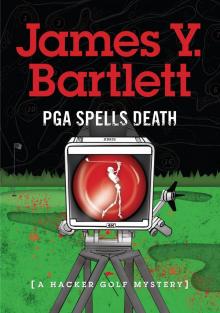 P.G.A. Spells Death
P.G.A. Spells Death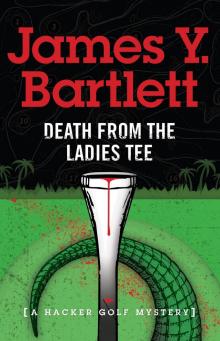 Death from the Ladies Tee
Death from the Ladies Tee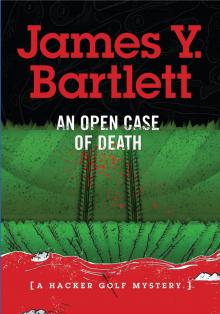 An Open Case of Death
An Open Case of Death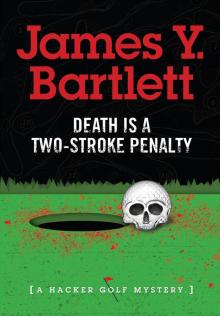 Death is a Two-Stroke Penalty
Death is a Two-Stroke Penalty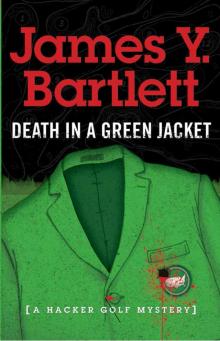 Death in a Green Jacket
Death in a Green Jacket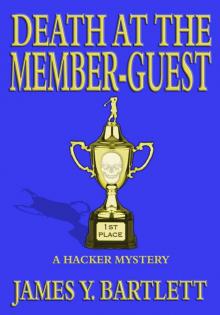 Death at the Member Guest
Death at the Member Guest